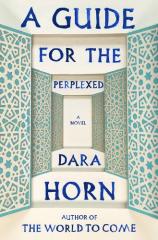Reading Group Guide
Discussion Questions
A Guide for the Perplexed

1.) Josie’s Genizah software categorizes memories by themes like “entertainment” and “travel” and carefully curates what it records in order to bury the unpleasant and the ugly. Do our minds work this way? Would you subscribe to Genizah? How have other technologies already changed how you experience things and remember them?
2.) What is the significance of dreams in the novel? Does it make sense to catalog them in Genizah along with daytime memories, as Nasreen wants to do? Do you think they are “mental garbage” or “a window to a world beyond what a waking person could perceive”?
3.) Maimonides tried to reconcile faith and reason in his writings. What role do religion, rational thought, and intelligence play in how the characters see themselves and others?
4.) Josie designed her software to record patterns in human behavior, which she thinks can be used to predict future outcomes. Maimonides believed that, as the ancient rabbis expressed it, “Everything is foreseen, but freedom of choice is granted.” Are their beliefs compatible? Do you believe that you are in control of the choices you make?
5.) When Josie is putting together a Genizah of Tali from memory, she realizes that the Tali who emerges is very different from the one captured by the software at home. What does this suggest about Josie’s feelings toward her daughter? How does their relationship differ from Tali’s relationship with Judith?
6.) One of Cairo’s unique features is its vast necropolis full of living squatters, but Nasreen says, “All cities are really cities of the dead.” Do you agree with her? Do you live in a place where you can feel the generations that came before you?
7.) How do Josie and Judith and their relationship change over the course of the novel? Which of the sisters do you most sympathize with?
8.) Schechter says, “Every human being, in the end, becomes the opposite of an archive.” He also describes himself as a palimpsest --- a piece of parchment on which one text has been inscribed over another. What does he mean by using these metaphors, and how do they apply to himself and others? Do they also apply to the novel itself?
9.) The book is full of encounters between people of different backgrounds: Judith and Itamar, Schechter and the Scottish twins, Mosheh and the vizier, and Josie and Nasreen, to name a few. How do these people view each other? What cultural differences and worldviews come to light in their conversations?
10.) There are four pairs of siblings in the novel: Judith and Josie, Schechter and Srulik, Margaret and Agnes, and Mosheh and David. How does the novel explore themes of jealousy, ambition, success, and love through the siblings? Did their relationships remind you of your relationships with your siblings?
11.) In what ways does the novel’s narrative parallel the biblical story of Joseph? Do you think this correspondence enhances the power of the novel? In general, are biblical stories relevant to the present or to understanding the challenges of modern life?
12.) Did Judith deserve Josie’s forgiveness in the end? Did Josie deserve Judith’s? Did the final chapter about Tali change the way you felt about the outcome of the story?
13.) Like historians piecing together the past, several characters wish to bring the dead back “to life” through bits of memory, writings, photographs, and recordings. Is this possible? How have you dealt with the death of someone you loved and the artifacts --- such as letters and photographs—that were left behind?
14.) How do the three stories --- of Josie and Judith Ashkenazi, Solomon Schechter, and Mosheh ben Maimon --- intersect and relate to one another? How does Maimonides’s GUIDE FOR THE PERPLEXED echo through all the layers of the novel?
A Guide for the Perplexed
- Publication Date: September 9, 2013
- Genres: Fiction
- Hardcover: 352 pages
- Publisher: W. W. Norton & Company
- ISBN-10: 0393064891
- ISBN-13: 9780393064896








